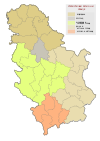| Revision as of 14:57, 13 October 2009 editAjdebre (talk | contribs)7,703 edits →History← Previous edit | Revision as of 14:58, 13 October 2009 edit undoAjdebre (talk | contribs)7,703 edits →HistoryNext edit → | ||
| Line 31: | Line 31: | ||
| ] | ] | ||
| In 1425 Stefan Lazarević held a major meeting in ] because of the question on who would succeed him to the Serb throne (he had no children), he chose ]. | In 1425 Stefan Lazarević held a major meeting in ] because of the question on who would succeed him to the Serb throne (he had no children), he chose ]. | ||
| Stragari is mentioned for the first time in Turkish census documentation in 1476 as '''Strgar'''. At that time, Stragari had only 39 households. From 1717 to 1739 the town saw a large influx of Austrians. It received the status of town in 1922. | Stragari is mentioned for the first time in Turkish census documentation in 1476 as '''Strgar'''. At that time, Stragari had only 39 households. From 1717 to 1739 the town saw a large influx of Austrians. It received the status of town in 1922. | ||
Revision as of 14:58, 13 October 2009
Template:Infobox Serbia municipality
Stragari (Страгари) is a village and municipality situated in the central part of Šumadija District in Serbia. The municipality of Stragari is one of the five municipalities of Kragujevac city.
Geography
Located at 44°9′N 20°40′E / 44.150°N 20.667°E / 44.150; 20.667 and at 250 m above sea level, it lies 30 km northwest of Kragujevac and about 120 km south of state capital, Belgrade.
It lies on the outfall of Srebrnica river intо Jasenica River, on the northeastern side of the Rudnik Mountain (highest peak - Cvijić's peak, 1,132 m).
Stragari with 10 surrounding villages forms one of five municipalities of city of Kragujevac. Estimated population of the municipality is 4,500.
In Stragari is one of the biggest asbestos mines in Europe.
History

In 1425 Stefan Lazarević held a major meeting in Srebrnice because of the question on who would succeed him to the Serb throne (he had no children), he chose Đurađ Branković. Stragari is mentioned for the first time in Turkish census documentation in 1476 as Strgar. At that time, Stragari had only 39 households. From 1717 to 1739 the town saw a large influx of Austrians. It received the status of town in 1922.
In monastery Voljavča (Вољавча) near Stragari in 1805. the First Serbian government (called "Praviteljstvujušči sovjet") held their first sessions.
Economy
This is an agricultural area and farmers are producing fruit, vegetables and breeding cattle.
Stragari's main industrial plant is Stragarit (paper industry).
Stragari has the preconditions necessary for development of a tourism industry.
The spa "Voljavča" and the monastery with the same name are located there as well as good facilities for recreation activities and hunting.
Municipalities
The city of Kragujevac is divided into the following municipalities:
Inhabited places
- Stragari
- Veliki Šenj
- Vlakča
- Dobrača
- Kamenica
- Kotraža
- Ljubičevac
- Mala Vrbica
- Masloševo
- Ramaća
- Ugljarevac
Gallery
-
 Part of Stragari with Ramacski peak (813 m) behind
Part of Stragari with Ramacski peak (813 m) behind
-
 Stragarit
Stragarit
-
 Asbestos
Asbestos
-
 Ljubićevac on Rudnik Mt., near Stragari
Ljubićevac on Rudnik Mt., near Stragari
References
External links
- Maps, Weather, and Airports for Stragari, Serbia & Montenegro
- Stragari.co.yu - Stragari na internetu
This Serbia location article is a stub. You can help Misplaced Pages by expanding it. |


